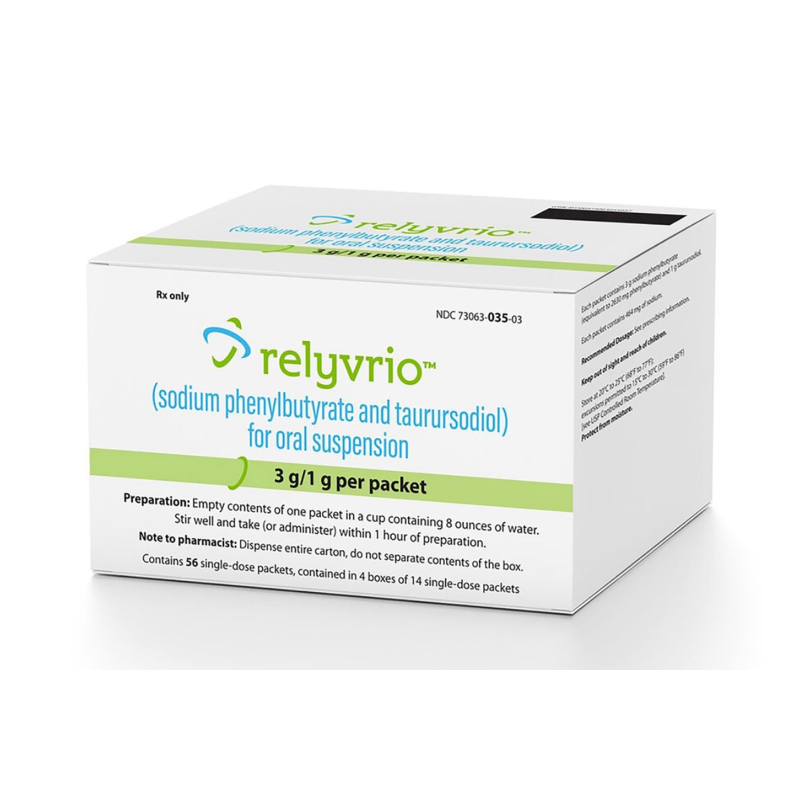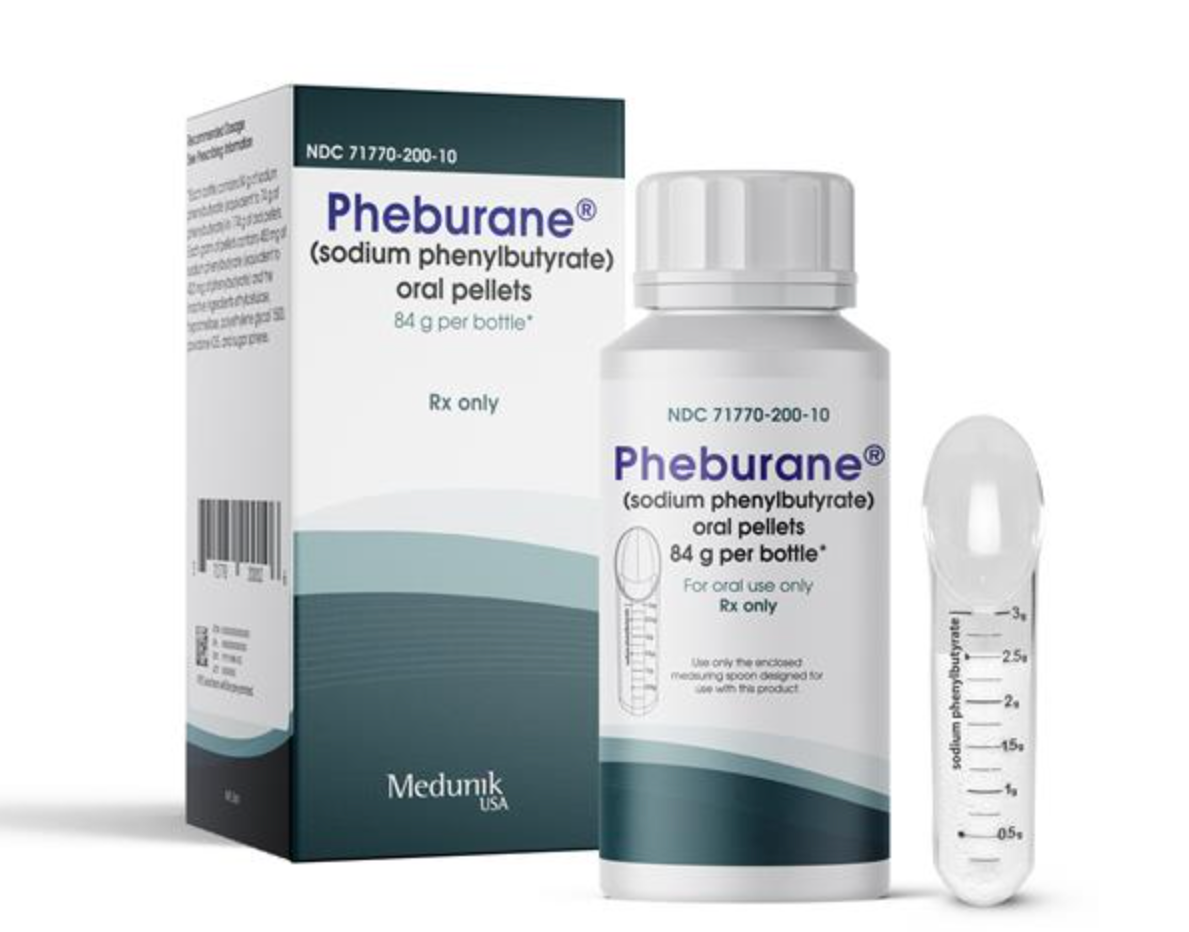Relyvrio (sodium phenylbutyrate and taurursodiol) vs Pheburane (sodium phenylbutyrate)
Relyvrio (sodium phenylbutyrate and taurursodiol) vs Pheburane (sodium phenylbutyrate)
Relyvrio (sodium phenylbutyrate and taurursodiol) is a medication approved for the treatment of amyotrophic lateral sclerosis (ALS), a progressive neurodegenerative disease, and it combines two active substances that may help slow disease progression. Pheburane (sodium phenylbutyrate) is a different formulation of sodium phenylbutyrate that is indicated for the treatment of urea cycle disorders, which are genetic disorders that lead to the accumulation of ammonia in the blood. When deciding between these medications, it is important to consider the specific condition being treated, as Relyvrio is tailored for ALS patients, while Pheburane is designed for managing urea cycle disorders, and the choice should be based on the diagnosis and recommendation of a healthcare professional.
Difference between Relyvrio and Pheburane
| Metric | Relyvrio (sodium phenylbutyrate and taurursodiol) | Pheburane (sodium phenylbutyrate) |
|---|---|---|
| Generic name | Sodium phenylbutyrate and taurursodiol | Sodium phenylbutyrate |
| Indications | Treatment of amyotrophic lateral sclerosis (ALS) | Treatment of urea cycle disorders |
| Mechanism of action | Sodium phenylbutyrate is a prodrug of phenylacetate which is converted to phenylacetyl-CoA, taurursodiol stabilizes mitochondrial function | Converted to phenylacetate, which reacts with glutamine to form phenylacetylglutamine, thereby reducing ammonia levels |
| Brand names | Relyvrio | Pheburane |
| Administrative route | Oral | Oral |
| Side effects | Diarrhea, abdominal pain, nausea, upper respiratory tract infection, dizziness | Headache, nausea, vomiting, constipation, tiredness, abnormal taste |
| Contraindications | Hypersensitivity to active ingredients | Hypersensitivity to sodium phenylbutyrate or any component of the formulation |
| Drug class | Neurological agent | Urea cycle disorder agent |
| Manufacturer | Amylyx Pharmaceuticals | Lucane Pharma |
Efficacy
Efficacy of Relyvrio in Amyotrophic Lateral Sclerosis (ALS)
Relyvrio, known by its generic components as sodium phenylbutyrate and taurursodiol, has been approved by the U.S. Food and Drug Administration (FDA) for the treatment of adults with amyotrophic lateral sclerosis (ALS). ALS is a progressive neurodegenerative disease that affects nerve cells in the brain and spinal cord, leading to loss of muscle control. The efficacy of Relyvrio in ALS was evaluated in a randomized, double-blind, placebo-controlled trial. Patients treated with Relyvrio experienced a slower decline in the ALS Functional Rating Scale-Revised (ALSFRS-R) score, which is a measure of the patient's ability to perform daily activities, compared to those receiving a placebo. This suggests that Relyvrio may have a beneficial effect on maintaining functional abilities in individuals with ALS.
The trial also indicated that Relyvrio had an impact on the overall survival of ALS patients. The results demonstrated a trend towards increased survival in the Relyvrio-treated group compared to the placebo group. This finding is particularly significant given the typically aggressive progression and poor prognosis associated with ALS. While the exact mechanism by which Relyvrio exerts its effects in ALS is not fully understood, it is believed to reduce neuronal cell death through multiple pathways, including mitochondrial stabilization and reduction of oxidative stress.
Efficacy of Pheburane in Amyotrophic Lateral Sclerosis (ALS)
Pheburane, which is also sodium phenylbutyrate, is a medication that is traditionally used for the treatment of urea cycle disorders. Its use in ALS is considered off-label, and there is limited data on its efficacy specifically for this condition. However, the component sodium phenylbutyrate is part of the combination that makes up Relyvrio, which has been shown to be effective in the treatment of ALS. The potential efficacy of Pheburane in ALS may be attributed to its role in promoting neuronal cell survival and reducing stress on the endoplasmic reticulum in nerve cells.
It is important to note that the use of Pheburane for ALS should be based on clinical judgment and a thorough understanding of the patient's condition. Since Pheburane is not specifically approved for ALS, and its efficacy for this indication has not been established through rigorous clinical trials, it is essential for healthcare providers to consider the available evidence and potential risks when contemplating its off-label use for ALS patients. Further research may be needed to fully understand the effects of Pheburane on ALS and to provide definitive guidance on its use in this patient population.
Regulatory Agency Approvals
Relyvrio
-
Food and Drug Administration (FDA), USA

Pheburane
-
European Medical Agency (EMA), European Union

-
Food and Drug Administration (FDA), USA

Access Relyvrio or Pheburane today
If Relyvrio or Pheburane are not approved or available in your country (e.g. due to supply issues), you can access them via Everyone.org.
How it works

Make an enquiry
Choose the medicine you want to buy, answer a couple of questions, and upload your prescription to speed things up. We’ll get back to you within 24 hours.


Make an enquiry
Choose the medicine you want to buy, answer a couple of questions, and upload your prescription to speed things up. We’ll get back to you within 24 hours.


Breeze through the paperwork
We'll guide you through the required documents for importing unapproved medicine, ensuring you have all the necessary information.


Get a personalized quote
We’ll prepare a quote for you, including medicine costs and any shipping, administrative, or import fees that may apply.


Receive your medicine
Accept the quote and we’ll handle the rest - sourcing and safely delivering your medicine.

Some text on this page has been automatically generated. Speak to your physician before you start a new treatment or medication.
Let's talk
If you have any questions, call us or send us a message through WhatsApp or email:
Contact us




